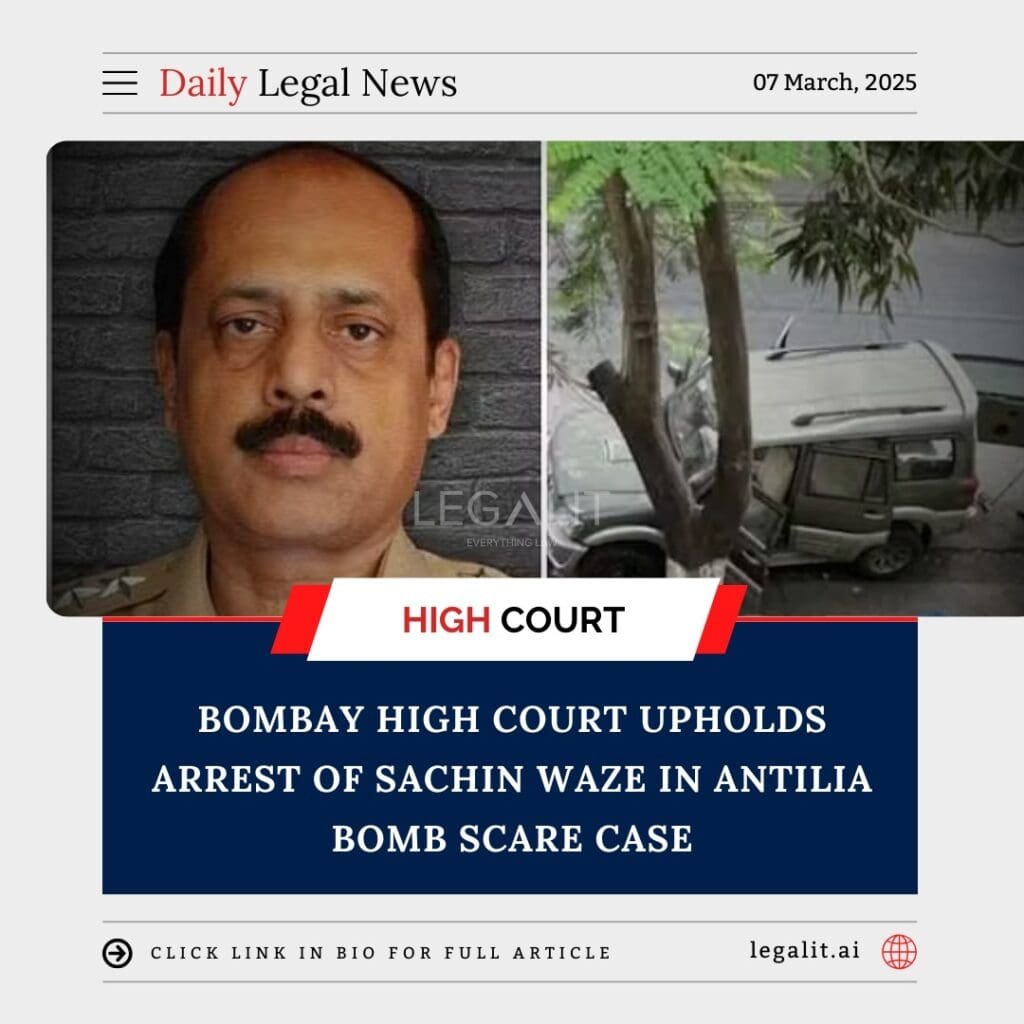
Background
The Bombay High Court has upheld the arrest of former Mumbai Police officer Sachin Waze in connection with the Antilia bomb scare case, reinforcing the legal validity of the investigation against him. Waze, a dismissed Assistant Police Inspector, was arrested by the National Investigation Agency (NIA) in March 2021 after an SUV laden with explosives was found near Mukesh Ambani’s residence, Antilia, in Mumbai.
The case took a dramatic turn when businessman Mansukh Hiran, the registered owner of the vehicle, was found dead under suspicious circumstances. The investigation pointed to a larger conspiracy involving Waze and other police officials. The NIA charged him under multiple sections of the Unlawful Activities (Prevention) Act (UAPA) and Indian Penal Code (IPC), alleging his direct involvement in planting the explosives and orchestrating the crime.
Court’s Rationale
In its ruling, the Bombay High Court rejected Waze’s plea challenging his arrest, stating that:
- There Was Sufficient Prima Facie Evidence
- The court noted that the investigation revealed Waze’s active involvement in the planning and execution of the crime.
- His links to the explosives-laden vehicle and subsequent attempts to mislead the probe were considered strong grounds for his arrest.
- National Security Was at Stake
- Given the gravity of the case, involving a high-profile target and potential threats to public safety, the court held that stringent anti-terror laws like UAPA were applicable.
- The court observed that acts of terrorism, regardless of intent or actual harm, warrant strict judicial scrutiny.
- Custodial Interrogation Was Justified
- The High Court upheld the NIA’s argument that Waze’s custodial interrogation was necessary to uncover the larger conspiracy, including potential involvement of other law enforcement officials.
- His high-ranking position in the Mumbai Police raised concerns about misuse of power and obstruction of justice.
- Mansukh Hiran’s Death Was Closely Linked to the Case
- The suspicious circumstances of Hiran’s murder strengthened the case against Waze, with evidence suggesting his role in eliminating a key witness.
- The court held that this aspect could not be overlooked in assessing the legality of his arrest.
Existing Legal Framework
- Unlawful Activities (Prevention) Act, 1967 (UAPA) – Provides stringent provisions for investigating terror-related offenses, including extended detention and denial of bail in cases of national security.
- Indian Penal Code, 1860 (IPC) – Includes provisions for criminal conspiracy (Section 120B), murder (Section 302), and destruction of evidence (Section 201).
- Explosives Act, 1884 – Regulates the possession, use, and transportation of explosive substances.
Implications of the Judgment
- Strengthening of National Security Laws – The ruling sets a precedent that law enforcement officials will not be shielded if they are found misusing their positions for criminal activities.
- Message Against Police Corruption – The case highlights the need for accountability within the police force, ensuring that officers are held to the highest standards of integrity.
- Continued Investigation into Conspiracies – The NIA can continue its probe into other possible actors involved in the crime, including those within the law enforcement system.
Conclusion
By upholding Waze’s arrest, the Bombay High Court has reinforced the legal framework ensuring that even high-ranking law enforcement officials are not above the law. The judgment underscores the seriousness of the Antilia bomb scare case and highlights the need for a thorough and impartial investigation into acts that threaten national security.